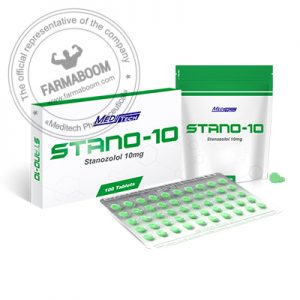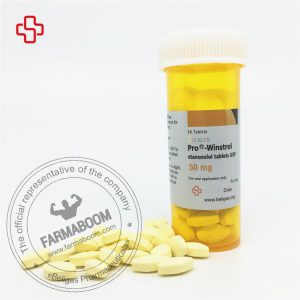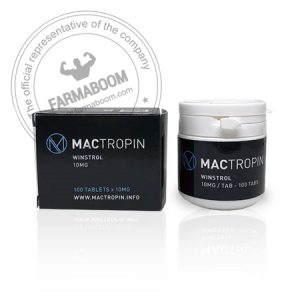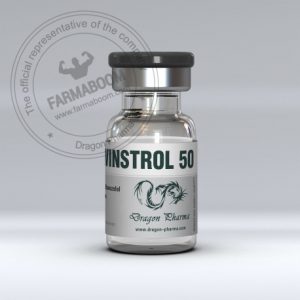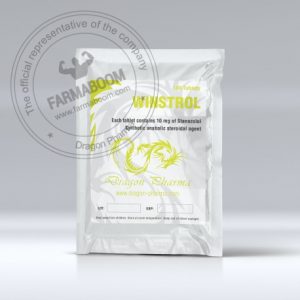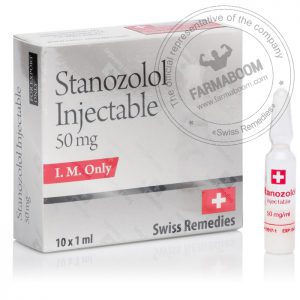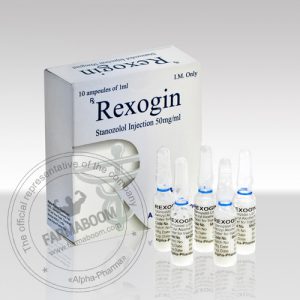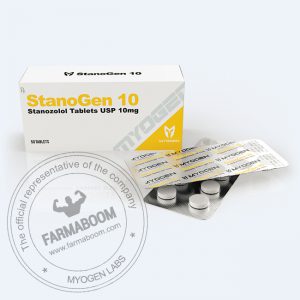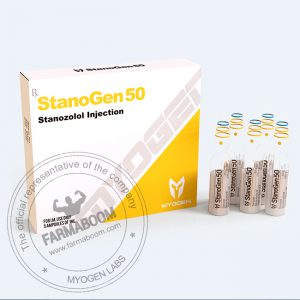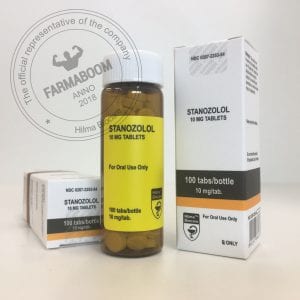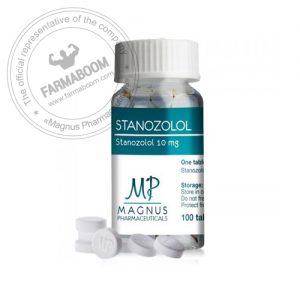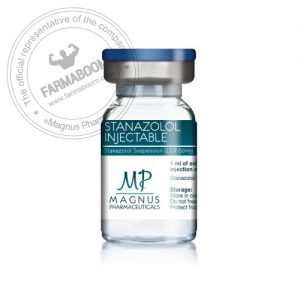DESCRIPTION
Stanozolol 50 is an aqueous suspension of the C17 a-alkylated steroid stanozolol, an oral androgen derived from dihydrotestosterone. Stanozolol 50 acts on androgen receptors to promote anabolism through increased nitrogen retention and protein synthesis in muscle tissue.
Stanozolol 50 is a strong anabolic substance with androgenic action. Stanozolol does not convert to estrogen and therefore does not produce typical estrogen mediated side effects such as water retention.
While chemically identical to oral stanozolol, Stanozolol 50 is injected IM eliminating the first pass of liver metabolism of its oral counterpart reducing stress on the liver. Stanozolol reduces SHBG increasing free testosterone levels.
CLINICAL PHARMACOLOGY
Anabolic steroids are synthetic derivatives of the natural steroid testosterone. Stanozolol has been demonstrated to increase LDL and decrease HDL with serum lipid values returning to baseline after cessation of use. Hereditary angioedema (HAE) is an autosomal dominant disorder caused by a deficient or nonfunctional C1 esterase inhibitor (C1 INH) and is clinically characterized by episodes of swelling of the face, extremities, genitalia, bowel wall, and upper respiratory tract.
In small clinical studies, stanozolol was effective in controlling the frequency and severity of attacks of angioedema and in increasing serum levels of C1 INH and C4. Stanozolol is not effective in stopping HAE attacks while they are underway. The effect of stanozolol on increasing serum levels of C1 INH and C4 may be related to an increase in protein anabolism.
INDICATIONS
Hereditary Angioedema: for prophylactic use to decrease frequency and severity of attacks of angioedema.
Muscle Anabolism: for adjunctive therapy in patients for weight gain following severe muscular atrophy associated with extensive surgery, chronic infections, long term hospitalization, or severe trauma.
Corticosteroid Atrophy: to reduce muscle wasting during prolonged corticosteroid use.
CONTRAINDICATIONS
Not for use in female patients due to risk of virilization and fetal harm.
Male patients with known or suspected carcinoma of the breast, prostate, or testis.
Patients with hypercalcaemia as anabolic steroids may stimulate osteolytic bone resorption.
Patients with cardiovascular disorders, renal or hepatic impairment, epilepsy, migraines, or diabetes mellitus.
Nephrosis or the nephrotic phase of nephritis.
PRECAUTIONS
Anabolic steroids may cause suppression of clotting factors II, V, VII and X and an increase in prothrombin time.
Anabolic steroids may increase sensitivity to anticoagu-lants. Dosage of anticoagulants may have to be decreased in order to maintain the prothrombin time at the desired therapeutic level.
Oral hypoglycemic dosage may need adjustment in diabetic patients who receive anabolic steroids.
Patients should be monitored for hepatotoxicity and jaundicing.
ADVERSE REACTIONS
Hepatic: Cholestatic jaundice with rarely, hepatic necrosis and death. Hepatocellular neoplasms and peliosis hepatis have been reported in association with long term andro-genic anabolic steroid use. Reversible changes in liver function tests also occur including increased bromsulphal-ein (BSP) retention and increases in serum bilirubin, glutamic oxaloacetic transaminase (SGOT), and alkaline phosphatase.
Genitourinary System (post pubertal men): Inhibition of testicular functions, testicular atrophy, and oligospermia, impotence, chronic priapism, epididymitis and bladder irritability.
Genitourinary System (Women): Clitoral enlargement, menstrual irregularities.
In both sexes: increased or decreased libido.
CNS: Habituation, excitation, insomnia, and depression.
Hematologic: Bleeding in patients on concomitant anticoagulant therapy.
Hair: Hirsutism and male pattern baldness in those genetically predisposed.
Other: Acne, oily skin, electrolytic retention, reversible changes in serum lipids.
PATIENT MONITORING
Serum Cholesterol, HDL, LDL, TG. Hemoglobin and Hematocrit, Hepatic function tests – AST/ALT.
Prostatic specific antigen – PSA, Testosterone: total, free, and bioavailable. Dihydrotestosterone & Estradiol.
Male patients over 40 should undergo a digital rectal examination and evaluate PSA prior to androgen use. Periodic evaluations of the prostate should continue while on androgen therapy, especially in patients with difficulty in urination or with changes in voiding habits.
DOSAGE AND ADMINISTRATION
Muscle anabolism: 50 – 100 mg injected IM every 2 days for a duration of 4 weeks.
Hereditary angioedema: as prescribed by physician.
The use of anabolic steroids is associated with serious adverse reactions. Such reactions are often dose depend-ent. Physicians are urged to treat patients with the lowest possible effective dose.
PRESENTATION
Stanozolol 50 mg/ml, 10ml multiple dose vial.
STORAGE
Store in a cool dry place between 15 – 25ºC. Protect from light.

